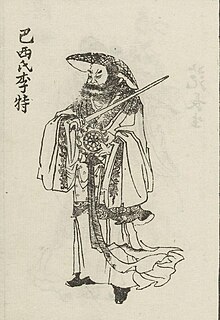| Li Te 李特 | |||||||||||||||||||||
|---|---|---|---|---|---|---|---|---|---|---|---|---|---|---|---|---|---|---|---|---|---|
| ruler of Cheng-Han | |||||||||||||||||||||
 | |||||||||||||||||||||
| ruler of Cheng-Han | |||||||||||||||||||||
| Reign | 303 | ||||||||||||||||||||
| Successor | Li Liu | ||||||||||||||||||||
| Died | 303 | ||||||||||||||||||||
| |||||||||||||||||||||
| Dynasty | Cheng-Han | ||||||||||||||||||||
Li Te (李特, died 303), courtesy name Xuanxiu (玄休), posthumously King Jing of Chengdu (成都景王) and later Emperor Jing (景皇帝), was the spiritual founder of the Ba-Di-led Cheng-Han dynasty during the Sixteen Kingdoms period of Chinese history. Under the ruling Jin dynasty (266–420), he and many people from present-day Gansu sought refuge in Yizhou due to Qi Wannian's rebellion. In 300, he ousted the rebelling provincial Inspector, Zhao Xin, and established a strong presence in the region. He initially agreed to coexist with the new Inspector, Luo Shang, but due to conflicting interests, they eventually went to war with each other. Li Te had the upper hand early on, and in 303, he hinted at the formation of a new state. However, before he could do so, he was abruptly killed in an ambush by Jin forces. Regardless, his brother Li Liu and his son Li Xiong continued the war, with the latter finally forcing Luo Shang out from the provincial capital, Chengdu in 304. Li Xiong established the state of Cheng (later named Han in 338), and posthumously honoured his father as a king and later an emperor.